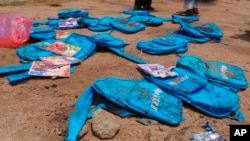Houthi rebels in Yemen have agreed to halt drone and missile attacks on Saudi Arabia or its coalition partner the United Arab Emirates, following a U.N. call for a cease-fire in the region.
The Iran-backed Houthi rebels said that they would comply with the U.N. call if Saudi Arabia "wants peace."
The group's leader Mohammed Ali al-Houthi said in a statement that they had halted attacks at the request of U.N. special envoy Martin Griffiths.
Saudi King Salman said that he was determined to abide by international efforts to forge a cease-fire in Yemen
Arab media still reported some scattered pockets of fighting around the Yemeni Red Sea port city of Hodeida Monday.
The U.S.-backed Saudi-led coalition has been at war with the Houthi rebels since they seized the capital of Sana'a in 2014, forcing the Yemeni government into temporary exile in Saudi Arabia. It has since relocated to Aden.
The United Nations is hoping for peace talks in Yemen, the Arab world's poorest country, by the end of the year.
Hilal Khashan, a political science professor at the American University of Beirut, believes that a ceasefire will eventually take hold in Yemen, but that each side wants to fire the final shot before it goes into effect.
"Usually, before a ceasefire goes into effect, we normally witness an escalation of hostilities and it appears to me that since the fighting continues in Hodeida and the claim that they fired a rocket or a missile into Saudi Arabia that did not reach its target tells us that the Houthis are keen on telling everybody that the last shot was theirs before the cease-fire," Khashan told VOA.
Saudi-led airstrikes on the rebels have obliterated entire civilian neighborhoods, including hospitals, and have compounded the misery in Yemen, which is also dealing with starvation and a cholera outbreak.
Edward Yeranian contributed to this report.





